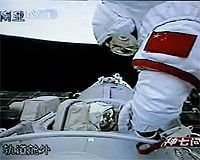 It has been an exciting few days for those of us geeky types who follow developments in space exploration. For those of you who would question just why we should have such an interest, I'd urge you to read on. On Sunday, we witnessed the world's first ever privately researched and funded orbital launch. The following day, China became the third nation (after the United States and Russia) to successfully conduct a spacewalk under their own power. These events stand as examples of two of the major trends in modern space exploration; commercialisation and the emerging new space race in Asia. This week also saw the 2008 International Astronautical Congress. The opening day brought talks from the heads of several space agencies, including our own European Space Agency (ESA) as well as the Russians, NASA and of course, the now rather smug Chinese. One significant point of discussion, as reported by Short Sharp Science, perhaps reflects the recent global economic chaos. That topic of course was the cost of space exploration. There's no two ways about it, space exploration is expensive. Getting objects into a low orbit costs in the region of €6000 per kilogram and that's about as cheap as it gets. That cost reflects the sheer energy required to break free of the Earth. Research and development for new vehicles, probes and experiments is very pricey too. It’s unsurprising then that NASA's annual budget is somewhere in the region of €20 billion; a figure that will likely come under scrutiny now that the USA is in recession. The justifications presented by these representatives perhaps play to what the public are interested in. Every-day personal benefit. NASA's Mike Griffin pointed out the considerable number of technological advancements that arose out of the research needed to go to space. The miniaturisation of electronics being an obvious development that has lead to the various gadgets we have in our homes. He also pointed to weather satellite technology and the satnav network that many of us now use in our cars. The director general of ESA echoed this sentiment, pointing to Columbus in 1492. We couldn't have imagined the gains we would make from exploration until we set off down that path.
It has been an exciting few days for those of us geeky types who follow developments in space exploration. For those of you who would question just why we should have such an interest, I'd urge you to read on. On Sunday, we witnessed the world's first ever privately researched and funded orbital launch. The following day, China became the third nation (after the United States and Russia) to successfully conduct a spacewalk under their own power. These events stand as examples of two of the major trends in modern space exploration; commercialisation and the emerging new space race in Asia. This week also saw the 2008 International Astronautical Congress. The opening day brought talks from the heads of several space agencies, including our own European Space Agency (ESA) as well as the Russians, NASA and of course, the now rather smug Chinese. One significant point of discussion, as reported by Short Sharp Science, perhaps reflects the recent global economic chaos. That topic of course was the cost of space exploration. There's no two ways about it, space exploration is expensive. Getting objects into a low orbit costs in the region of €6000 per kilogram and that's about as cheap as it gets. That cost reflects the sheer energy required to break free of the Earth. Research and development for new vehicles, probes and experiments is very pricey too. It’s unsurprising then that NASA's annual budget is somewhere in the region of €20 billion; a figure that will likely come under scrutiny now that the USA is in recession. The justifications presented by these representatives perhaps play to what the public are interested in. Every-day personal benefit. NASA's Mike Griffin pointed out the considerable number of technological advancements that arose out of the research needed to go to space. The miniaturisation of electronics being an obvious development that has lead to the various gadgets we have in our homes. He also pointed to weather satellite technology and the satnav network that many of us now use in our cars. The director general of ESA echoed this sentiment, pointing to Columbus in 1492. We couldn't have imagined the gains we would make from exploration until we set off down that path.Isolation fallacy
 I can see why such points are made, but I see them as being just as short sighted as the criticism levelled at space exploration, and manned space travel in particular. It's often claimed by some that we should fix the problems we have here on Earth before we venture into space. Quite how much time it would take for us to eliminate war, famine and poverty I have no idea. But I consider such thinking to be very silly indeed. The reason I say this is because I suspect that part of the drive to "prioritise" our budgets stems from a severe misconception. I call it the isolation fallacy; the mistaken belief that we are meaningfully separate from "space". In other words, many people tend to think of space as a location that is in some manner distinct from Earth. I think they're wrong. We can imagine the universe as a wild landscape. Vast and wide, with mountains and valleys. The Earth sits in a bit of a depression in that landscape. Being in a shallow hole, it can be tricky for us explore the landscape. The only thing that separates us from the rest of the universe are the practical difficulties we face in getting out of that hole. The aforementioned launch costs, the research and development costs and of course safety concerns. However, none of these things affects anything that might want to come in the other direction. Solar flares, gamma ray bursts and bloody big rocks, to name a few. Although these things are extremely rare, they are all things which can wipe out our civilisation irrespective of how we think about the Earth and space. They see no boundary and we're only beginning to understand what risks we face. We need to learn, but what is perhaps equally important is our need to spread.
I can see why such points are made, but I see them as being just as short sighted as the criticism levelled at space exploration, and manned space travel in particular. It's often claimed by some that we should fix the problems we have here on Earth before we venture into space. Quite how much time it would take for us to eliminate war, famine and poverty I have no idea. But I consider such thinking to be very silly indeed. The reason I say this is because I suspect that part of the drive to "prioritise" our budgets stems from a severe misconception. I call it the isolation fallacy; the mistaken belief that we are meaningfully separate from "space". In other words, many people tend to think of space as a location that is in some manner distinct from Earth. I think they're wrong. We can imagine the universe as a wild landscape. Vast and wide, with mountains and valleys. The Earth sits in a bit of a depression in that landscape. Being in a shallow hole, it can be tricky for us explore the landscape. The only thing that separates us from the rest of the universe are the practical difficulties we face in getting out of that hole. The aforementioned launch costs, the research and development costs and of course safety concerns. However, none of these things affects anything that might want to come in the other direction. Solar flares, gamma ray bursts and bloody big rocks, to name a few. Although these things are extremely rare, they are all things which can wipe out our civilisation irrespective of how we think about the Earth and space. They see no boundary and we're only beginning to understand what risks we face. We need to learn, but what is perhaps equally important is our need to spread.Go forth
Civilisations can be fragile things. The ancient Greeks floundered. The Roman Empire was sacked. However, despite these individual failings, human civilisation as a whole has proven rather resilient. We have certainly been set back culturally many times. But for every collapsed civilisation there have been others who inherited their knowledge, technologies and philosophy. Who learned from their mistakes, and moved forward once again. Our culture, taken on a worldwide scale, has become extremely robust. Even were modern western civilisation to collapse, it would not set back human culture by much. This robustness is a product of two factors; how far our species has spread and how well we communicate. To destroy our culture would now require the death of pretty much all humans. Even a small remnant could now rapidly regain our lost culture. The previously mentioned threats from outside of Earth certainly hold the potential to land that killing blow. We also now have an unprecedented capacity to destroy ourselves via nuclear war or ecological disaster. There is an imbalance there. Our capacity to destroy ourselves has never been greater, yet we lack the ability to spread ourselves further and thus enhance the stability of our culture and ensure the future of our species. We cannot readily escape Earth, nor can we settle elsewhere in a self-sufficient manner. We have much to learn, and given that we could well annihilate ourselves without help of anything from
 space, time is of the essence. The manned space programmes of NASA and the Russian and Chinese space agencies represent the only means by which we can learn the lessons needed to achieve those goals. To view their work as some sort of luxury is to entirely underestimate the risks we face and misunderstand what space represents; our only realistic shot at long-term survival.
space, time is of the essence. The manned space programmes of NASA and the Russian and Chinese space agencies represent the only means by which we can learn the lessons needed to achieve those goals. To view their work as some sort of luxury is to entirely underestimate the risks we face and misunderstand what space represents; our only realistic shot at long-term survival. 




No comments:
Post a Comment